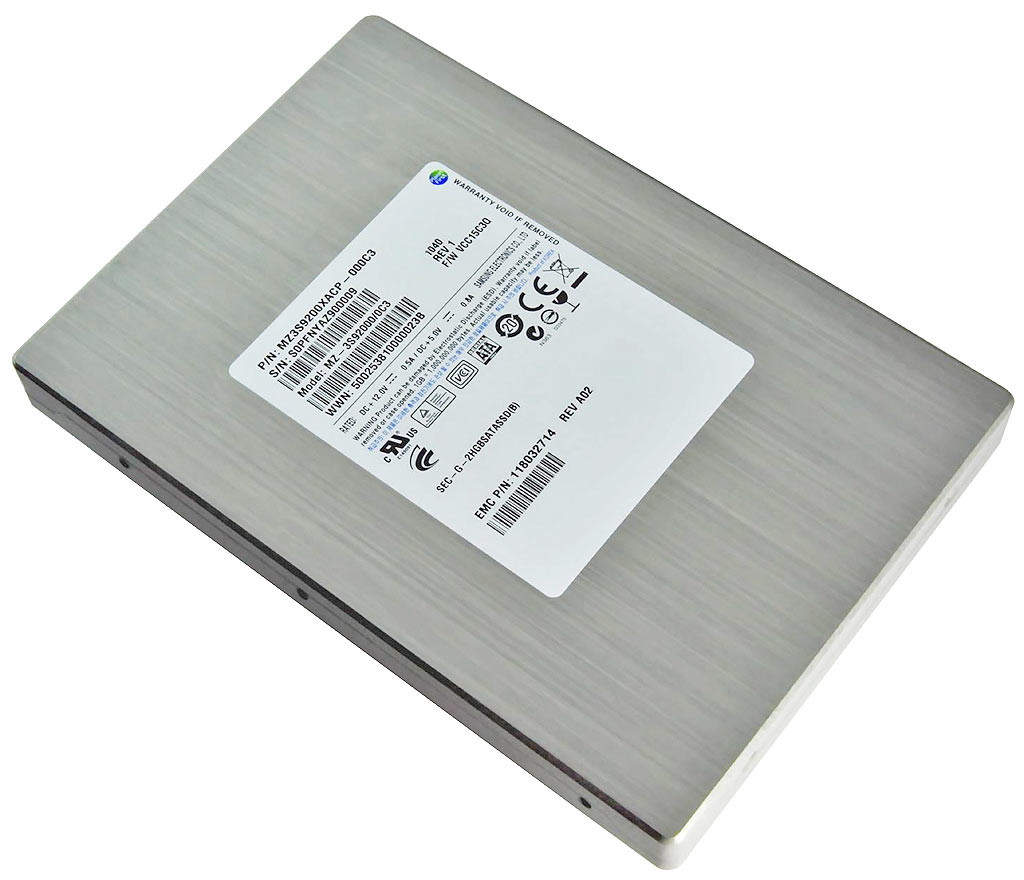SSDs In RAID: A Performance Scaling Analysis
RAID arrays with dozens of hard drives are not uncommon for reaching certain performance levels. We demonstrate how beautifully SSD RAID arrays can scale. There may come a time when a few flash-based drives will replace entire farms of hard disks.
Five SSDs In RAID 0
The five SSDs used in the test come from Samsung. They do not have any strong product name, carrying only “Samsung SLC SSD“ and the product tag MZ3S9100-XAB4. Each drive has a capacity of 100 GB, is based on SLC NAND flash, has a 3 Gb/s SATA interface, and support for TRIM and Native Command Queuing (NCQ). Samsung claims 260 MB/s read and 245 MB/s write rates.
With an idle energy consumption of 1.7 W, this SSD requires much more than consumer models. It reaches 3.7 W under load, which is still acceptable compared to enterprise-class hard drives spinning at 10 000 and 15 000 RPM. Conventional disks can reach up to four times that number. Operating temperature is rated at between -10°C and 60°C, which is fairly standard in the SSD space. Samsung also offers a 200 GB model, should you need more server storage capacity.
In order to demonstrate the scalability as clearly as possible, we first benchmarked one of these SSDs and then created a RAID 0 array of two drives. With each new benchmark run, we added an additional drive so that, in the end, we can compare five test configurations and their differences easily.
Of course, the fast (but unsafe) RAID 0 mode is only used in special cases, while RAID modes with built-in redundancy are typically preferred. For this test however, we deliberately chose RAID 0, since it represents a best case for the kind of scaling we can expect.
Get Tom's Hardware's best news and in-depth reviews, straight to your inbox.
Current page: Five SSDs In RAID 0
Prev Page SATA Bottleneck: 3 Gb/s Is Not Enough Next Page Test Setup-
mrbongal007 hi, pls help in understanding how are you getting 1000 MB/s performance on a sata3 port/lane which gives max of 600MB/s. if the answer is raid striping across 5 lanes then potentially we can get this performance on a sata2 port as well since each lane is being taxed to appx 200MB/s. appreciate your help in understanding this. thanks.Reply -
oxxfatelostxxo OutPut is through a pci x8 slot. Max transfer of 6gb/s I think. The sata 2 max is per channel for each drive. Not a combined maxReply -
chefboyeb I guess i would be better off adding 2 more ocz vertex ssds to my existing 3 ssd raid 0 setup afterall... I was concerned about the limitations of motherboard, but not anymore... ThanksReply -
maybe is just me only.Reply
3 reason hold me back moving HD to SSD.
1st. money VS pre GB.
2nd. the technology is mature enough to keep that real speed in stabilize performance.
3rd. RAID support in SSD still in wonderland.
conclusion. all the read/write speed in the benchmark is full of BS, but if you can maintain the driver is reading purpose only but never erase and delete any old data and rewrite new files into it. and you are a heavily download user. you will lost the speed advance reading/writing in a SSD over a traditional HD. SSD is pretty fast only in a fresh windows install for the first time. it will lose speed performance in time and you have to do another fresh reinstall again and again. -
nebun oxxfatelostxxo... The motherboard will Max out. You need a raid card to see those speedsor just use an PCIE SSD like the revodrive x2 :) no limitReply
